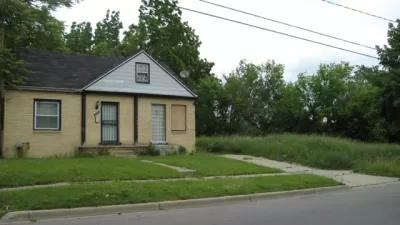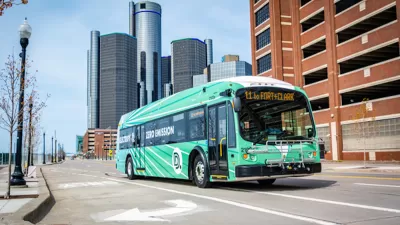Would the Motor City have produced Motown without pianos in every living room?

"The history of American music was literally shaped by the single family housing character of Detroit," writes Aaron M. Renn.
David Maraniss's new book, Once in a Great City: A Detroit Story, points to the signs of decline as early as 1963 when the city was in its economic and artistic heyday. (As Adam Gopnik keenly describes it in The New Yorker, "Humpty Dumpty's most poignant moment [was] just before he toppled over.") But here Renn zeroes in on a housing lesson that runs counterintuitive to today's thinking about urban planning. The single-family homes of Detroit allowed working- and middle-class families to accommodate pianos; and the piano was the springboard for the great musical energy that would become known around the world as Motown.
Renn cautions against making too much of the connection. "As Gordy was founding Motown, Jane Jacobs was pointing out the trouble with Detroit’s 'gray belts' of single families that were already being abandoned." Certainly, Detroit was not the only city of its time with a predominance of single-family homes. Gopnik points to in-group competition, as studied by art historian E.H. Gombrich, as a likely cause of such renaissance, likening it more to 13th-century Florence than other Rust Belt cities. "If Detroit got it worse, it was partly because it had it better," Gopnik writes.
Renn's point is that cities would do well to think creatively about their unique sets of constraints and circumstances. "What this suggests is that cities shouldn’t despair too much about their existing built form, even if in many cases they are struggling with it. The question might be, what does that form enable that you can’t get elsewhere?"
FULL STORY: How Urban Planning Made Motown Records Possible

Trump Administration Could Effectively End Housing Voucher Program
Federal officials are eyeing major cuts to the Section 8 program that helps millions of low-income households pay rent.

Planetizen Federal Action Tracker
A weekly monitor of how Trump’s orders and actions are impacting planners and planning in America.

Canada vs. Kamala: Whose Liberal Housing Platform Comes Out on Top?
As Canada votes for a new Prime Minister, what can America learn from the leading liberal candidate of its neighbor to the north?

Washington State’s Parking Reform Law Could Unlock ‘Countless’ Acres for New Housing
A law that limits how much parking cities can require for residential amd commercial developments could lead to a construction boom.

Wildlife Rebounds After the Eaton Fire
Following the devastation of the Eaton Fire, the return of wildlife and the regrowth of native plants are offering powerful signs of resilience and renewal.

LA to Replace Inglewood Light Rail Project With Bus Shuttles
LA Metro says the change is in response to community engagement and that the new design will be ready before the 2028 Olympic Games.
Urban Design for Planners 1: Software Tools
This six-course series explores essential urban design concepts using open source software and equips planners with the tools they need to participate fully in the urban design process.
Planning for Universal Design
Learn the tools for implementing Universal Design in planning regulations.
Central Transportation Planning Staff/Boston Region MPO
Heyer Gruel & Associates PA
Institute for Housing and Urban Development Studies (IHS)
City of Grandview
Harvard GSD Executive Education
Regional Transportation Commission of Southern Nevada
Toledo-Lucas County Plan Commissions





























